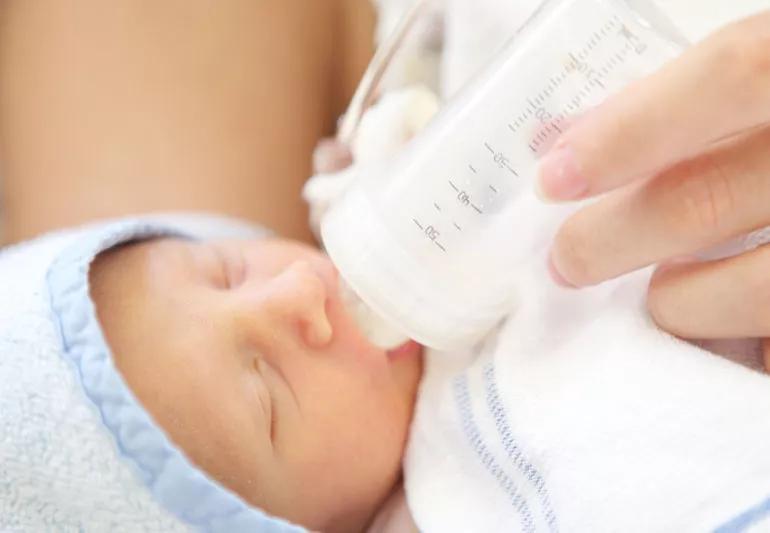Answers to common questions parents of preemies have

Image content: This image is available to view online.
View image online (https://assets.clevelandclinic.org/transform/a664748b-62e7-4343-a24e-9b277eefa958/premieHomeAdvice-471306103-770x533-1_jpg)
Mother bottle feeding her premature baby
Becoming a parent can be overwhelming — and even more so if your infant spent time in the neonatal intensive care unit, or NICU. Whether your premature baby spent a few days or a few months in the NICU, they may have more complex needs than babies born at term.
Advertisement
Cleveland Clinic is a non-profit academic medical center. Advertising on our site helps support our mission. We do not endorse non-Cleveland Clinic products or services. Policy
“In the NICU, we offer a lot of education and support for parents. But once they go home, they feel they are on their own,” says neonatologist Anirudha Das, MD. “Babies who started life in the NICU are often fragile, and the parents are anxious. So it’s helpful to know what to expect.”
Preemies are more prone to sudden infant death syndrome (SIDS) than term babies. Dr. Das encourages all parents to follow the sleep safety guidelines from the American Academy of Pediatrics, including:
Dr. Das also recommends not using store-bought movement or oxygen monitors. They are unreliable and often give a false sense of security that everything is fine, he says.
Advertisement
“A premature baby’s immune system is not fully developed, so be extra cautious,” Dr. Das says. “Breast milk gives antibodies, which provide the baby with an extra measure of protection. Whenever possible, we encourage moms to nurse their babies or pump and feed breast milk in a bottle.”
Dr. Das also recommends:
“Parents can bathe their baby every day, as long as they keep the room temperature higher, so the baby doesn’t get cold in the bath or immediately after,” says Dr. Das. “And since babies tend to have dry skin, I recommend putting moisturizer on the skin within 5 to 10 minutes after their bath.”
Dr. Das says all preterm babies have reflux and may vomit two to three times a day, which is normal. He recommends parents receive CPR training, because there is a risk of choking with reflux.
Other important feeding-related advice includes:
“These days, few babies go home with an apnea monitor, and most don’t go home on oxygen,” says Dr. Das. “If your baby does need an apnea monitor or oxygen for a short time, you’ll be given instructions before you leave the NICU.”
Before the neonatologist discharges your baby, they’ll do a car seat challenge test. Your baby will stay in a car seat for two hours to make sure they can breathe in the seat. Car seats could result in the neck position blocking the airway, so this is an important test to make sure your baby is safe.
Advertisement
Any pediatrician is qualified to care for a premature infant. If possible, stay within the same health system as the neonatologist to ensure seamless transition of care.
If you have questions in the period shortly after discharge, you can reach out to the neonatologist, but your baby’s pediatrician will be their primary care provider. For babies with complex issues, the outpatient neonatology team will follow your baby’s developmental milestones along with the pediatrician for the first two years of life.
“The mental health of parents is vital,” says Dr. Das. “They experience a lot of anxiety when their baby is in the NICU, so postpartum depression is a very real thing.”
Happy, healthy parents are key to healthy babies, Dr. Das says. He urges parents to get screened and find support if they feel anxious or depressed.
Advertisement

Sign up for our Health Essentials emails for expert guidance on nutrition, fitness, sleep, skin care and more.
Learn more about our editorial process.
Advertisement
They could be hungry, gassy, colicky or sleepy, or even too hot or too cold
Use a naptime schedule and relaxing sounds to encourage self-soothing
The short answer from a pediatrician
Facts about undescended testicles from a urologist
The short answer from a pediatrician
Pediatrician-approved sleep tips
Some fontanelle changes can reveal internal issues
Neonatal opioid withdrawal syndrome, or NOWS, can develop when a birthing parent uses opioids, nonmedical drugs or even some prescription drugs during pregnancy
Type 2 diabetes isn’t inevitable with these dietary changes
Applying a hot or cold compress can help with pain
Pump up your iron intake with foods like tuna, tofu and turkey